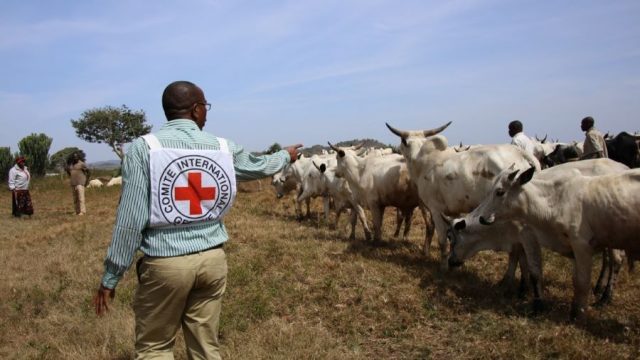…As part of the campaign, deworming medicine was also distributed to herders – helping protect their livestock from intestinal parasites
MON. 06 MARCH 2023-theGBJournal | Northeast Nigeria is home to one of Africa’s largest cattle markets. For many affected by long-running conflict in the region, ensuring the health of livestock as a means of livelihood is vital.
“Sometimes, especially during the dry season, we lose about 24 out of 40 of our livestock,” Ardo Abubakar tells one of our International Committee of the Red Cross (ICRC) colleagues in Mubi, northeast Nigeria.
“They drop dead, just like that,” he says.
Over a decade of conflict has taken its toll on communities in Mubi, Madagali and Michika on the border with Cameroon. Many rely on livestock for food or livelihoods. Cattle, sheep, and goats are all traded at one of the largest livestock markets in the region.
In this way, the well-being of livestock and those who rely on them are interlinked. Loss of livestock means loss of livelihoods for people already made vulnerable by conflict or displacement.
Ardo Abubakar tells us he doesn’t know why his livestock are dying. But for him, it’s a vital issue.
In these rural communities of northeast Adamawa, people use the meat and milk of livestock for food. They gain income by trading animals or animal products, allowing them to build cash reserves to meet their needs.
Livestock also play an important role in social life – as bridal prices or by providing income to support communities. But these herder communities have been made vulnerable by what has become a prolonged crisis. Conflict, violence, and crime have seen the theft and killing of livestock, making it harder to prevent outbreaks of disease that can decimate herds. It can be hard to plan for the future when dealing with existing vulnerabilities in the present.
Diseases like Contagious Bovine Pleuropneumonia (CBPP) in cattle and peste des petit ruminants (PPR) in sheep and goats are all too common in northeast Nigeria. Not least, access to animal health services is a challenge and there is an absence of disease prevention and control programs.
To help, the ICRC launched a vaccination campaign in 2022 that has reached more than half a million animals in Mubi, Michika and Madagali.
Targeting CBPP and PPR, the campaign aimed at preventing and controlling outbreaks, reducing morbidity and mortality rates, helping build immunity to make livestock more resistant to future occurrences of disease.
“We saw the benefit of the vaccines on our animals,” says Ardo Abdullahi, a leader in Kongoli village.
They now eat well, look healthy and have higher immunity – we wish this will be a yearly exercise.
As part of the campaign, deworming medicine was also distributed to herders – helping protect their livestock from intestinal parasites.
The ICRC works with authorities on the campaign, which is provided for free to herders and remains ongoing.
Mohammed Ali, an animal health worker in Maiha, tells us.
“But after the 2022 vaccinations, when they noticed a drastic drop in their livestock mortality rate, increased reproduction and milk production, it made this February campaign a huge success.”
This support provided to herders complements our support provided to farmers similarly impacted by conflict.
We provide this support across Nigeria, as around the world, to those in greatest need.-ICRC Report
Twitter-@theGBJournal|Facebook-the Government and Business Journal|email:gbj@govbusinessjournal.ng|govandbusinessj@gmail.com








